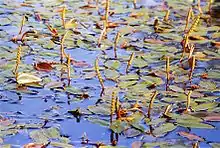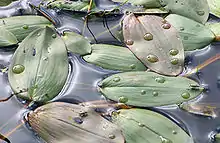Potamogeton natans
Potamogeton natans, commonly known as broad-leaved pondweed,[2] floating pondweed,[3] or floating-leaf pondweed, is an aquatic species in the genus Potamogeton native to quiet or slow-flowing freshwater habitats throughout the Holarctic Kingdom.
| Potamogeton natans | |
|---|---|
 | |
| Scientific classification | |
| Kingdom: | Plantae |
| Clade: | Tracheophytes |
| Clade: | Angiosperms |
| Clade: | Monocots |
| Order: | Alismatales |
| Family: | Potamogetonaceae |
| Genus: | Potamogeton |
| Species: | P. natans |
| Binomial name | |
| Potamogeton natans | |
Description

It produces both floating and submersed leaves on the same plant. The floating leaves are ovate to oblong-ovate and almost always cordate at the base. They are dark green, leathery, opaque, with translucent longitudinal veins. They are 5 to 10 cm long, pointed at the tips, and rounded at the base.
The stipules are 4 to 17 cm long.
The submerged grass-like structures are called phyllodes, are actually modified leaf stalks.
The stems are cylindrical, without many branches, and grow from 1 to 2 metres.
The main difference between this species and other pondweeds is a discoloured flexible joint just below the top of the long leaf stalk.
The flower spikes are dense, and cylindrical. They are 5 to 10 cm long, pointed at the tip and rounded at the base. It flowers from May to September.
The fruits are 4 to 5 mm long and obovate.[4]
References
- Gupta, A.K. (2013). "Potamogeton natans". IUCN Red List of Threatened Species. 2013. Retrieved 24 June 2018.CS1 maint: ref=harv (link)
- "BSBI List 2007". Botanical Society of Britain and Ireland. Archived from the original (xls) on 2015-01-25. Retrieved 2014-10-17.
- "Potamogeton natans". Natural Resources Conservation Service PLANTS Database. USDA. Retrieved 13 October 2015.
- Rose, Francis (2006). The Wild Flower Key. Frederick Warne & Co. pp. 490–491. ISBN 978-0-7232-5175-0.
External links
| Wikimedia Commons has media related to Potamogeton natans. |
| Wikispecies has information related to Potamogeton natans. |
